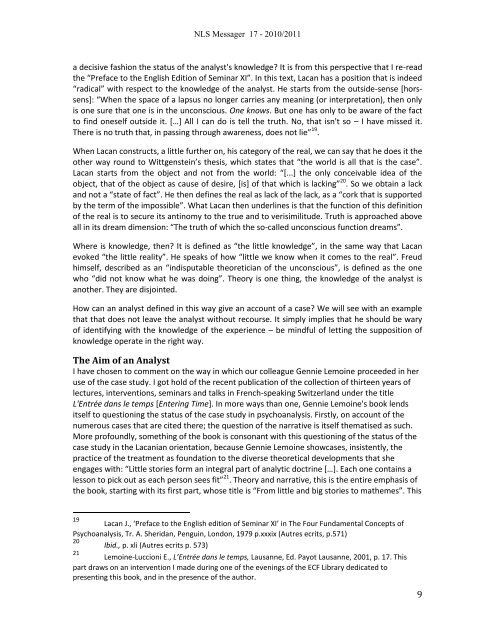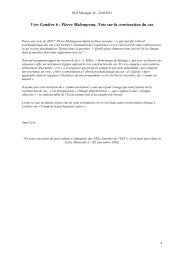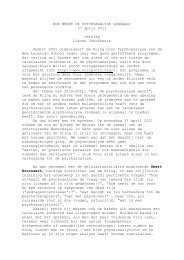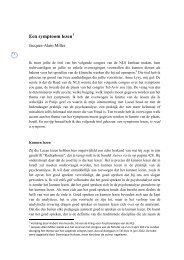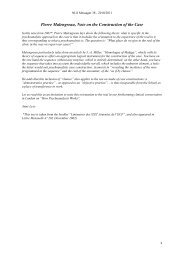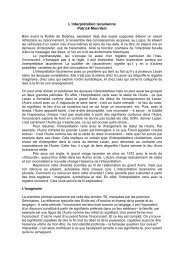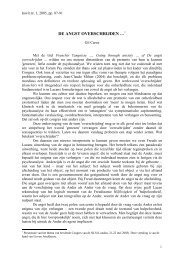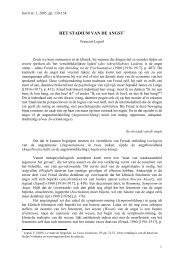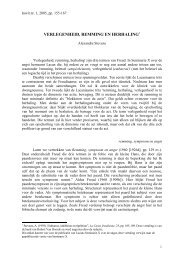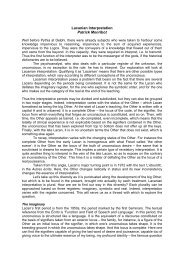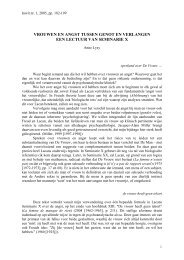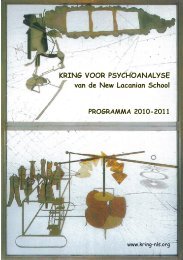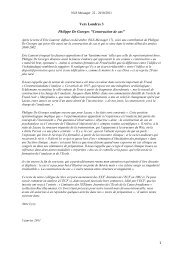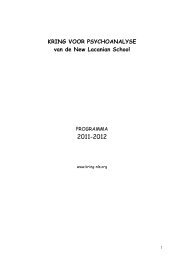Vers Londres 2 Eric Laurent, « Le cas, du - Psychoanalyse Lacan ...
Vers Londres 2 Eric Laurent, « Le cas, du - Psychoanalyse Lacan ...
Vers Londres 2 Eric Laurent, « Le cas, du - Psychoanalyse Lacan ...
Create successful ePaper yourself
Turn your PDF publications into a flip-book with our unique Google optimized e-Paper software.
NLS Messager 17 - 2010/2011<br />
a decisive fashion the status of the analyst's knowledge? It is from this perspective that I re-read<br />
the “Preface to the English Edition of Seminar XI”. In this text, <strong>Lacan</strong> has a position that is indeed<br />
“radical” with respect to the knowledge of the analyst. He starts from the outside-sense [horssens+:<br />
“When the space of a lapsus no longer carries any meaning (or interpretation), then only<br />
is one sure that one is in the unconscious. One knows. But one has only to be aware of the fact<br />
to find oneself outside it. *…+ All I can do is tell the truth. No, that isn't so – I have missed it.<br />
There is no truth that, in passing through awareness, does not lie” 19 .<br />
When <strong>Lacan</strong> constructs, a little further on, his category of the real, we can say that he does it the<br />
other way round to Wittgenstein’s thesis, which states that “the world is all that is the <strong>cas</strong>e”.<br />
<strong>Lacan</strong> starts from the object and not from the world: “*...+ the only conceivable idea of the<br />
object, that of the object as cause of desire, *is+ of that which is lacking” 20 . So we obtain a lack<br />
and not a “state of fact”. He then defines the real as lack of the lack, as a “cork that is supported<br />
by the term of the impossible”. What <strong>Lacan</strong> then underlines is that the function of this definition<br />
of the real is to secure its antinomy to the true and to verisimilitude. Truth is approached above<br />
all in its dream dimension: “The truth of which the so-called unconscious function dreams”.<br />
Where is knowledge, then? It is defined as “the little knowledge”, in the same way that <strong>Lacan</strong><br />
evoked “the little reality”. He speaks of how “little we know when it comes to the real”. Freud<br />
himself, described as an “indisputable theoretician of the unconscious”, is defined as the one<br />
who “did not know what he was doing”. Theory is one thing, the knowledge of the analyst is<br />
another. They are disjointed.<br />
How can an analyst defined in this way give an account of a <strong>cas</strong>e? We will see with an example<br />
that that does not leave the analyst without recourse. It simply implies that he should be wary<br />
of identifying with the knowledge of the experience – be mindful of letting the supposition of<br />
knowledge operate in the right way.<br />
The Aim of an Analyst<br />
I have chosen to comment on the way in which our colleague Gennie <strong>Le</strong>moine proceeded in her<br />
use of the <strong>cas</strong>e study. I got hold of the recent publication of the collection of thirteen years of<br />
lectures, interventions, seminars and talks in French-speaking Switzerland under the title<br />
L'Entrée dans le temps [Entering Time]. In more ways than one, Gennie <strong>Le</strong>moine's book lends<br />
itself to questioning the status of the <strong>cas</strong>e study in psychoanalysis. Firstly, on account of the<br />
numerous <strong>cas</strong>es that are cited there; the question of the narrative is itself thematised as such.<br />
More profoundly, something of the book is consonant with this questioning of the status of the<br />
<strong>cas</strong>e study in the <strong>Lacan</strong>ian orientation, because Gennie <strong>Le</strong>moine show<strong>cas</strong>es, insistently, the<br />
practice of the treatment as foundation to the diverse theoretical developments that she<br />
engages with: “Little stories form an integral part of analytic doctrine *…+. Each one contains a<br />
lesson to pick out as each person sees fit” 21 . Theory and narrative, this is the entire emphasis of<br />
the book, starting with its first part, whose title is “From little and big stories to mathemes”. This<br />
19<br />
<strong>Lacan</strong> J., ‘Preface to the English edition of Seminar XI’ in The Four Fundamental Concepts of<br />
Psychoanalysis, Tr. A. Sheridan, Penguin, London, 1979 p.xxxix (Autres ecrits, p.571)<br />
20<br />
Ibid., p. xli (Autres ecrits p. 573)<br />
21<br />
<strong>Le</strong>moine-Luccioni E., L’Entrée dans le temps, Lausanne, Ed. Payot Lausanne, 2001, p. 17. This<br />
part draws on an intervention I made <strong>du</strong>ring one of the evenings of the ECF Library dedicated to<br />
presenting this book, and in the presence of the author.<br />
9


